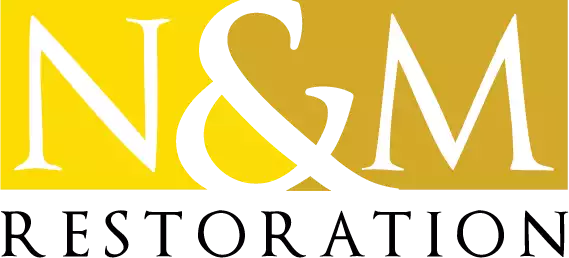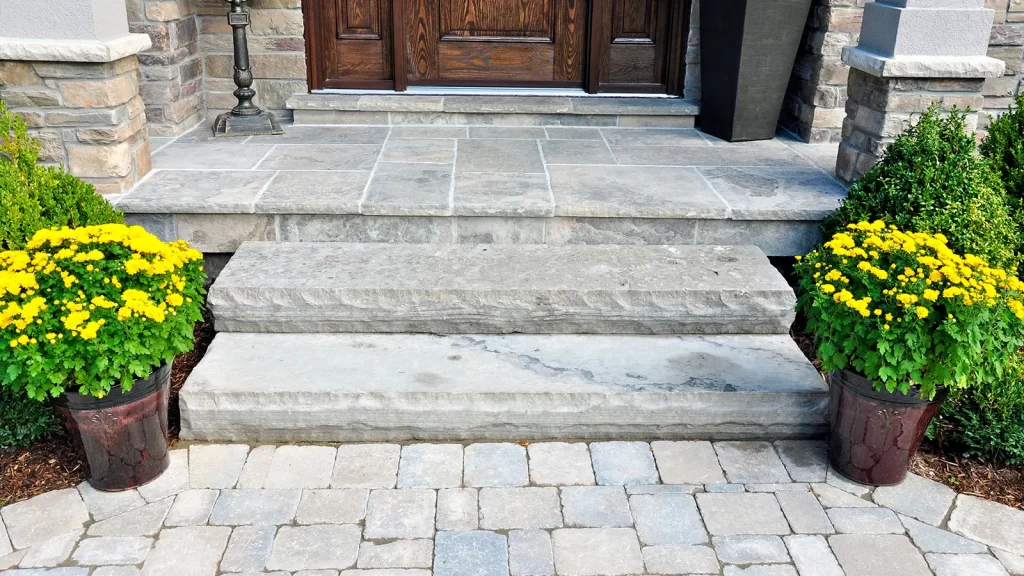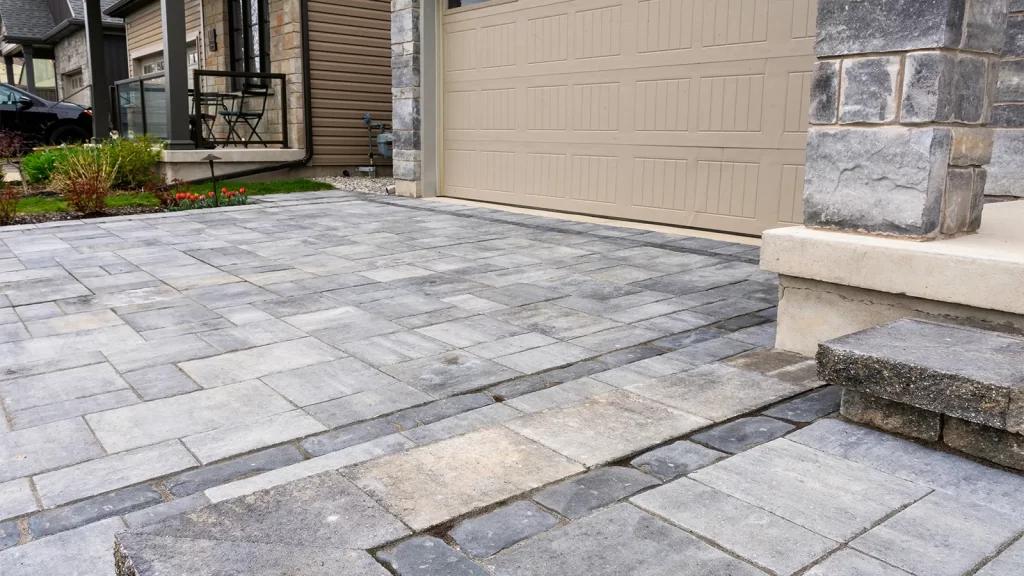Wooden Wonders: The Classic Choice
Wooden porches have stood as a classic choice for homeowners, radiating warmth and traditional charm. The innate beauty of wood, with its natural grains and warm hues, contributes to a timeless aesthetic that complements a range of architectural styles. But, let’s explore a range of porch materials.
Pros
- Aesthetic Appeal: The timeless appeal of wooden porches is undeniable. The natural look of wood creates an inviting and cozy atmosphere, making it a popular choice for those seeking a classic and welcoming entrance.
- Customization: Wood is a highly versatile material that allows for easy customization. Homeowners can stain, paint, or leave the wood natural to match their specific design preferences, enabling a seamless integration with the overall look of the home.
- Renewable Resource: Opting for sustainably sourced wood is not only an aesthetic choice but also an environmentally responsible one. Wood, when harvested and managed responsibly, is a renewable resource that contributes to a more sustainable building industry.
Cons
- Maintenance: The Achilles’ heel of wooden porches lies in the maintenance they demand. Regular sealing, staining, and protection against pests are essential to prevent issues such as rot, warping, and decay.
- Durability: While hardwoods like ipe and cedar exhibit natural resistance to decay, wood, in general, is susceptible to weathering, particularly in harsh climates. Continuous exposure to sunlight, rain, and snow can lead to degradation over time.
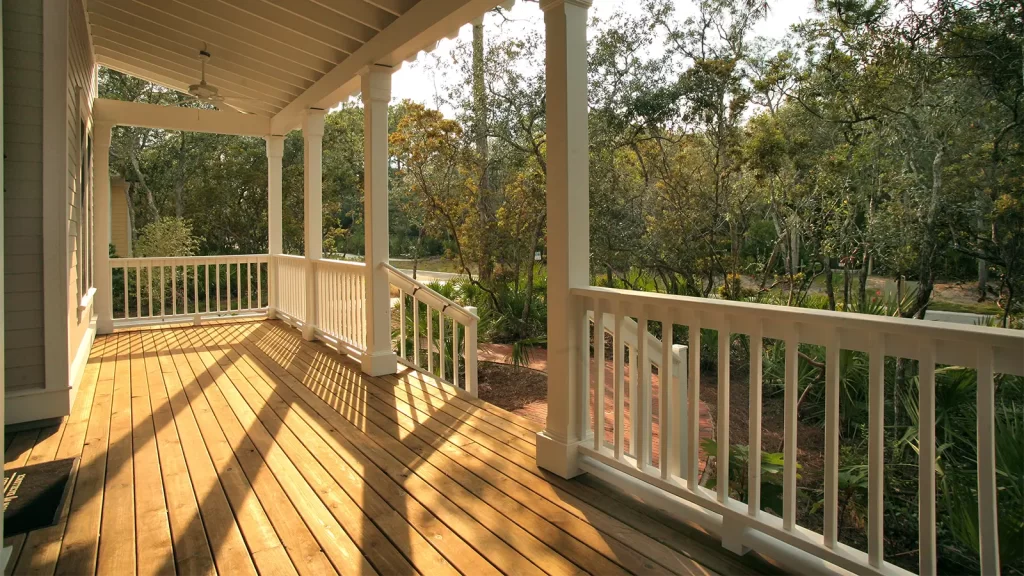
Concrete Wonders: The Sturdy Option
Concrete, with its inherent strength and versatility, has become a popular choice for porch construction. It offers a sturdy foundation with a range of design possibilities.
Pros
- Durability: Concrete is renowned for its strength and durability, making it an ideal choice for high-traffic areas. It can withstand heavy loads, ensuring a long-lasting porch that stands the test of time.
- Low Maintenance: In comparison to wood, concrete requires minimal maintenance. Regular cleaning and occasional resealing are usually sufficient to keep it in good condition, saving homeowners both time and effort.
- Versatility: Concrete provides a canvas for various design possibilities. It can be stamped, stained, or polished to mimic different textures and patterns, allowing for a customizable aesthetic that suits the homeowner’s taste.
Cons
- Cracking: Despite its durability, one of the primary concerns with concrete is the potential for cracking, especially in regions with extreme temperature fluctuations. Proper installation techniques and the use of expansion joints are crucial to mitigate this issue.
- Hardness: The hardness of concrete, while an asset in terms of durability, can be a drawback in terms of comfort. Prolonged standing or sitting on a concrete porch may be uncomfortable, necessitating the use of area rugs or outdoor furniture with cushions.
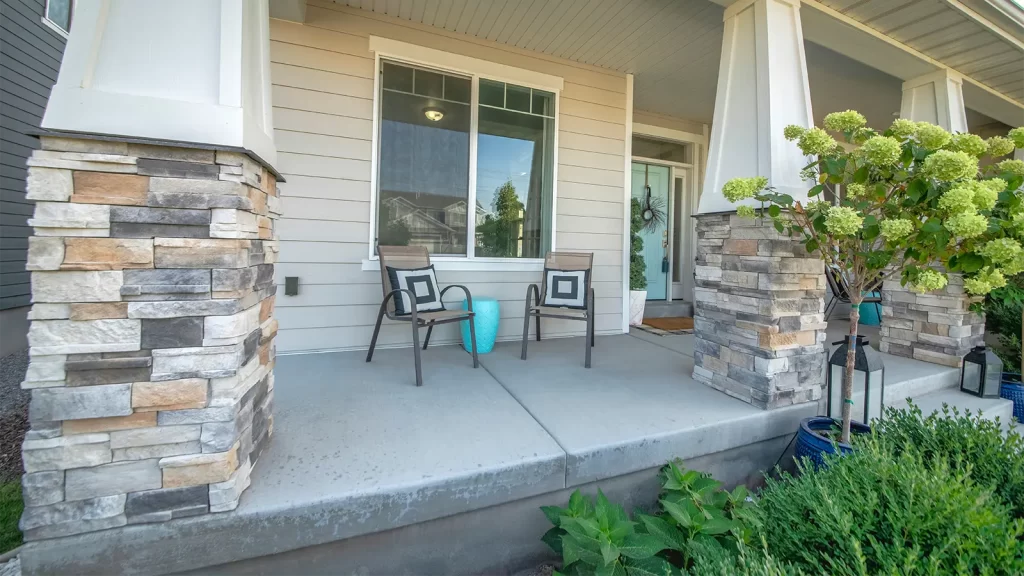
Stone and Pavers: Timeless Elegance in Porch Construction
Now, let’s turn our attention to the captivating allure of stone and pavers. These materials, with their timeless elegance, have proven to be enduring choices that elevate the aesthetic appeal of any home.
Pros
- Timeless Aesthetic: The natural beauty of stone and pavers brings a timeless elegance to porch construction. Whether it’s the richness of granite, the earthy tones of slate, or the classic appeal of travertine, these materials add a touch of luxury and sophistication to your porch.
- Durability: Stone, in its various forms, is exceptionally durable and resistant to weathering. It can withstand the elements, including harsh sunlight, rain, and snow, without compromising its integrity. This longevity makes stone a wise investment for homeowners seeking a porch that stands the test of time.
- Low Maintenance: Stone and pavers require minimal maintenance. Regular sweeping and occasional power washing are typically sufficient to keep them looking pristine. Unlike wood, they are not prone to rot or insect damage, reducing the need for constant attention.
- Variety of Options: From granite and slate to travertine and limestone, the variety of stone options allows homeowners to choose a material that complements the style of their home and personal preferences. Each type of stone brings its unique characteristics, providing ample choices for a customized porch.
Cons
- Cost: It’s essential to acknowledge that stone and pavers often come with a higher upfront cost compared to some other materials. However, when considering their longevity and minimal maintenance requirements, they prove to be a cost-effective choice in the long run.
- Installation Complexity: Achieving the full potential of stone or pavers requires precision and expertise during installation. Improper installation can result in uneven surfaces or shifting over time. Hiring a skilled professional is crucial for ensuring a successful outcome and maximizing the benefits of these materials.
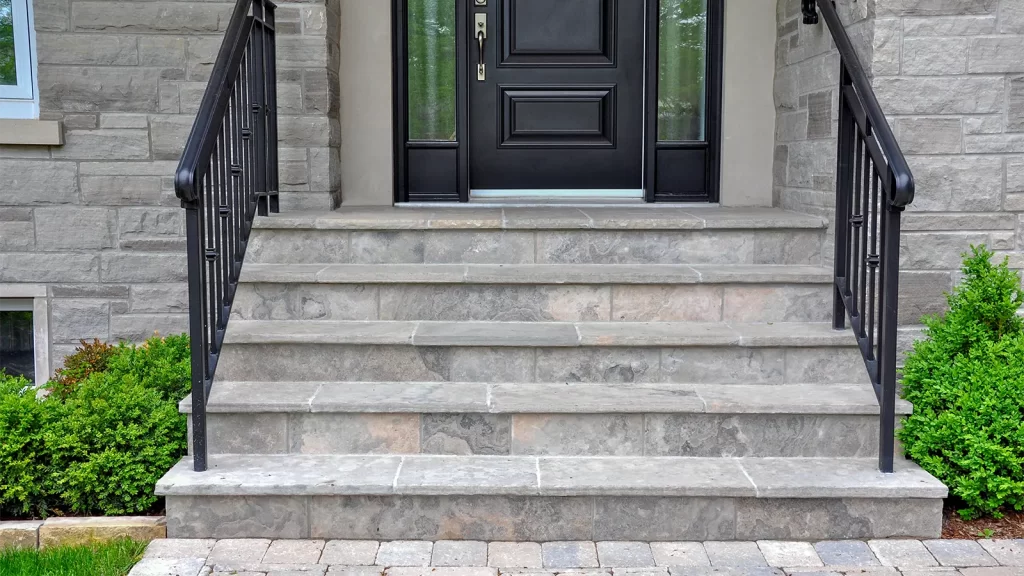
Conclusion
In the vast landscape of porch construction, the selection of materials involves weighing the pros and cons to align with one’s priorities, budget, and commitment to maintenance. Wooden porches offer a classic charm, concrete provides durability and versatility, but for those who seek a harmonious blend of timeless elegance and longevity, stone and pavers stand out as the quintessential choices.
While the initial cost of stone and pavers may be higher, the enduring appeal, minimal maintenance, and the wide variety of options make them a compelling investment. If you are captivated by the idea of a porch that not only weathers time with grace but also adds a touch of sophistication to your home, the timeless allure of stone and pavers may be the perfect fit for your porch construction project. As you embark on this journey, remember that your porch is not just an extension of your home; it is a statement, a welcoming embrace that reflects your style and commitment to lasting quality.
